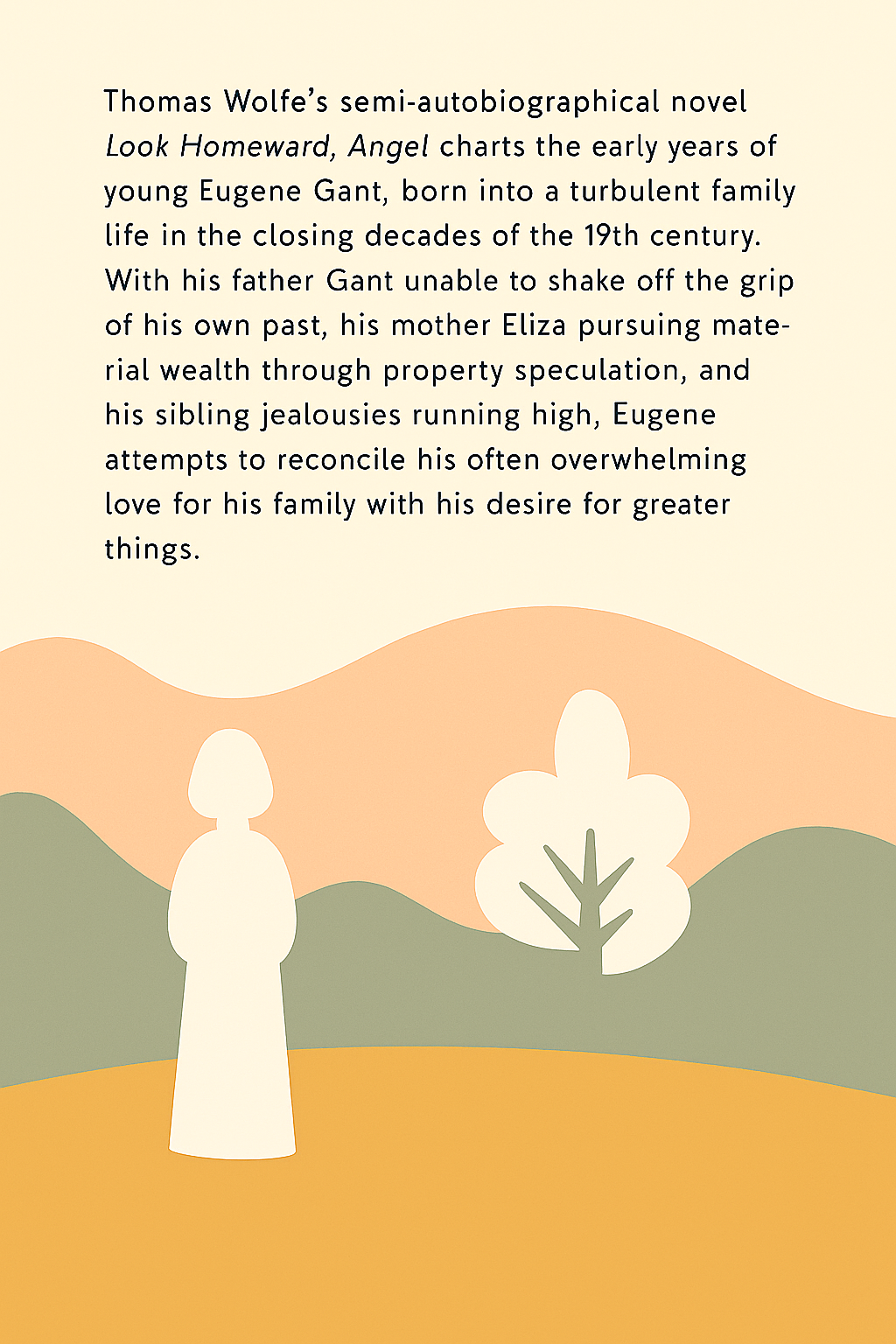 Image 1 of 2
Image 1 of 2

 Image 2 of 2
Image 2 of 2



Look Homeward, Angel
by Thomas Wolfe
This annotated edition of "Look Homeward, Angel" includes:
Explanations of historical context
Literary comments and analyses
Experience the torrent of American youth through Thomas Wolfe's autobiographical masterpiece "Look Homeward, Angel," a novel that captures the overwhelming intensity of growing up while creating one of literature's most vivid portraits of family life, small-town society, and the artistic temperament struggling toward self-expression.
The story of Eugene Gant's childhood and adolescence in the fictional town of Altamont creates both deeply personal narrative and universal examination of how individuals develop identity while seeking escape from constraining circumstances.
Wolfe's genius lies in his ability to transform the specific details of his own experience into epic celebration of American life while maintaining the emotional authenticity that makes great literature personally meaningful.
The novel's exploration of how family relationships can both nurture and suffocate individual development speaks to universal experiences of love, resentment, and the need for independence while examining the specific tensions that characterize American family life.
Eugene's character combines intellectual precocity with emotional vulnerability, creating a protagonist whose artistic ambitions feel both noble and pretentious while his struggles with family expectations and social limitations remain deeply sympathetic.
The work's treatment of the Gant family dynamics, particularly the relationship between Eugene's parents Eliza and W.O., reveals how personality differences can create both passion and conflict while demonstrating Wolfe's understanding that love and anger often spring from the same source.
The novel's detailed portrayal of early 20th-century small-town life provides both historical documentation and timeless examination of how communities can both support and constrain individual growth while artistic sensitivity creates both privilege and burden.
Characters like Ben Gant and Helen represent different responses to family circumstances while providing emotional anchors for Eugene's development and alternatives to his chosen path of artistic rebellion.
Wolfe's prose style achieves remarkable lyrical intensity while maintaining narrative momentum, creating language that captures both the beauty and pain of youth while establishing the rhetorical patterns that would characterize American confessional literature.
The work's influence on later autobiographical fiction demonstrates its success in balancing personal revelation with artistic objectivity while proving that individual experience can achieve universal significance through skillful artistic transformation.
Publication Date: July 29, 2025
Book Size: 5 x 1.33 x 8 inches
Format: Paperback
ISBN: 979-8289801814
*Ships within 2-4 business days
by Thomas Wolfe
This annotated edition of "Look Homeward, Angel" includes:
Explanations of historical context
Literary comments and analyses
Experience the torrent of American youth through Thomas Wolfe's autobiographical masterpiece "Look Homeward, Angel," a novel that captures the overwhelming intensity of growing up while creating one of literature's most vivid portraits of family life, small-town society, and the artistic temperament struggling toward self-expression.
The story of Eugene Gant's childhood and adolescence in the fictional town of Altamont creates both deeply personal narrative and universal examination of how individuals develop identity while seeking escape from constraining circumstances.
Wolfe's genius lies in his ability to transform the specific details of his own experience into epic celebration of American life while maintaining the emotional authenticity that makes great literature personally meaningful.
The novel's exploration of how family relationships can both nurture and suffocate individual development speaks to universal experiences of love, resentment, and the need for independence while examining the specific tensions that characterize American family life.
Eugene's character combines intellectual precocity with emotional vulnerability, creating a protagonist whose artistic ambitions feel both noble and pretentious while his struggles with family expectations and social limitations remain deeply sympathetic.
The work's treatment of the Gant family dynamics, particularly the relationship between Eugene's parents Eliza and W.O., reveals how personality differences can create both passion and conflict while demonstrating Wolfe's understanding that love and anger often spring from the same source.
The novel's detailed portrayal of early 20th-century small-town life provides both historical documentation and timeless examination of how communities can both support and constrain individual growth while artistic sensitivity creates both privilege and burden.
Characters like Ben Gant and Helen represent different responses to family circumstances while providing emotional anchors for Eugene's development and alternatives to his chosen path of artistic rebellion.
Wolfe's prose style achieves remarkable lyrical intensity while maintaining narrative momentum, creating language that captures both the beauty and pain of youth while establishing the rhetorical patterns that would characterize American confessional literature.
The work's influence on later autobiographical fiction demonstrates its success in balancing personal revelation with artistic objectivity while proving that individual experience can achieve universal significance through skillful artistic transformation.
Publication Date: July 29, 2025
Book Size: 5 x 1.33 x 8 inches
Format: Paperback
ISBN: 979-8289801814
*Ships within 2-4 business days

